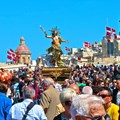A South African's guide to moving to and making it in Malta: A mark, a yen, a buck or a pound
In the South African banking landscape, we are accustomed to prestigious above the line campaigns from the Big Four centred on brand awareness. Here in Malta, the latest banking campaign is a guerrilla public relations offensive and is not from the financial institution but from a particularly disgruntled stakeholder group – it’s entire customer base.
Accounts at Satabank, a small international bank, were effectively frozen by the Malta Financial Services Authority (MFSA) last month, with EY (formerly Ernst and Young), appointed to administer the bank’s assets in “the best interests of depositors.” The move had come after a joint inspection and audit by the MFSA and Financial Intelligence Analysis Unit had found shortcomings in the bank’s anti-money laundering procedures.
Backlash campaign
As a backlash, a campaign has been launched locally to draw attention to the plight of Satabank customers. Account-holders have started a project to generate awareness amongst European citizens and foreign investors of the problems being faced and the crude manner in which the government is managing the situation. In a statement on Tuesday night, the self-styled Sata ‘victims’ said they planned to organise advertising, e-mail and social marketing campaigns to generate an average of 50,000 unique visits and up to 5 million unique users.
The organisers say they are targeting users who have shown interest in transferring their business to Malta over the past 12 months. The goal is to inform these people of Satabank’s history and the “shameful” management of the situation imposed by the MFSA on EY. The campaign, they said, would end once Satabank unlocked all company accounts.
Reputational damage
To understand the reputational damage to SataBank of the campaign as outlined, it is necessary to offer some contextual, personal and national background. Malta has a Big Two banking culture, with Bank of Valletta (BOV) and HSBC being the two largest retail banks. Outside of these behemoths, there are at least two dozen other credit institutions which are recognised by the MFSA.
Other than i-gaming (read: online betting) and tourism, financial services are one of the three pillars of the island’s economy. As a result, the government is incredibly sensitised to reputational risk regarding the sustainability, stability and security of the financial sector and international perceptions thereof. Because of the nature of the i-gaming industry (where large numbers of cross-border bets are processed daily), the sector breathes under a smoky haze of money-laundering.
Parallel to this, Malta offers an extremely advantageous corporate tax structure which has led many i-gaming companies to set themselves up on the little island which has a big international reputation as being the capital of the industry.
Importing talent
Due to its small size and limited human resource pool, Malta has been obliged to “import” talent to fill available positions in many companies. (Still, we are told, there is a significant skills shortage). As an aside, Maltese PM Joseph Muscat has already put it out there that for the archipelago to continue its economic momentum (as the fastest growing economy in the EU), we will need another 50,000 foreign workers to stoke the economic engine. Put into perspective, the Maltese islands are home to 475,000 inhabitants of which 50,000 of these are expats.
In short, we have a national economy that is dependent on the arrival of 50,000 new workers who will double the number of foreigners living on Malta. Within a year.
Against this background, a curiously counter-intuitive banking scenario exists where foreigners find it extremely difficult to access banking services here. As a result of the importance of reputational risk in the financial sector, Malta has set up extremely stringent Know Your Customer (KYC) hoops which would-be account-holders have to jump through.
As an expat myself who relocated to Malta 18 months ago, I can speak from my own experience. Although we opened personal accounts (at BOV) on the sister island of Gozo three years ago, the ease with which this was accomplished I have come to realise was because of a personal introduction to the bank.
We were taken into the branch by a local estate agent through whom we were putting an offer to purchase. She was so well networked on the island and so widely recognised by people waving to her in every village we drove through that if Gozo were a monarchy, she would be its undisputed sovereign.
Obstructionist protocols
In this strange alternate Maltese universe in which we live, cheques are still widely used as a form of payment on the island. Last month, when I made enquiries at our local branch of BOV to open a current account, I wished I had that Gozitan estate agent at my side. Amongst the extraordinary obstructionist protocols erected by BOV (acting according to an MFSA script), I had to be vouched for by a person with a professional qualification (notary, doctor, etc) who had to have known me for two years.
The degreed person was obliged to fill in a testimonial form attesting to both the duration of the relationship as well as my status as a person of good standing. (A scanned letter was deemed unacceptable since it was not possible to verify whether it bore an original signature). It took four appointments and several more administrative hurdles before I could collect a chequebook.
A year ago, at the instigation of our accountants who told us to open a business account, we approached our bankers of record BOV. We were called in for an interview (read: interrogation) and our application was subsequently turned down. We then called HSBC to make an appointment to open a company account – nobody returned the call. We came to Satabank as an expedient alternative to other disinterested or barred banking alternatives.
Our Maltese accountants identified Sata as being receptive to foreign nationals and offered to facilitate opening the account for us – for a fee of E400! Politely eschewing their offer, we thought we were up to opening the account ourselves. Although we were accepted by Sata, we were so overwhelmed by the KYC paperwork that we reluctantly had to admit defeat and, cap in hand, had to ask our local accountants to perform the service for us.
Cue the current headlines: SataBank is frozen by the MFSA in November 2018 due to suspicious of money laundering effectively putting 10,000 customers (many foreigners like myself who were declined by Maltese banks) outside of the banking system.
Many expats with personal accounts at Sata have been in dire straits without money for food and rental. Likewise, many companies have been hamstrung with cashflow problems and unable to pay salaries or suppliers. As Liza Minelli and Joel Grey sing in their satirical Cabaret turn from the show of the same name:
“When you haven’t any coal in the stove
And you freeze in the winter
And you curse to the wind at your fate
When you haven’t any shoes on your feet
Your coat’s thin as paper
And you look 30 pounds underweight
Although the Satabank customer campaign highlights the 10,000 account holders currently affected, in reality, their status is proxy for the 50,000 foreigners and any number of overseas businesses who experience an institutionalised stigmatisation in the banking system in Malta.











